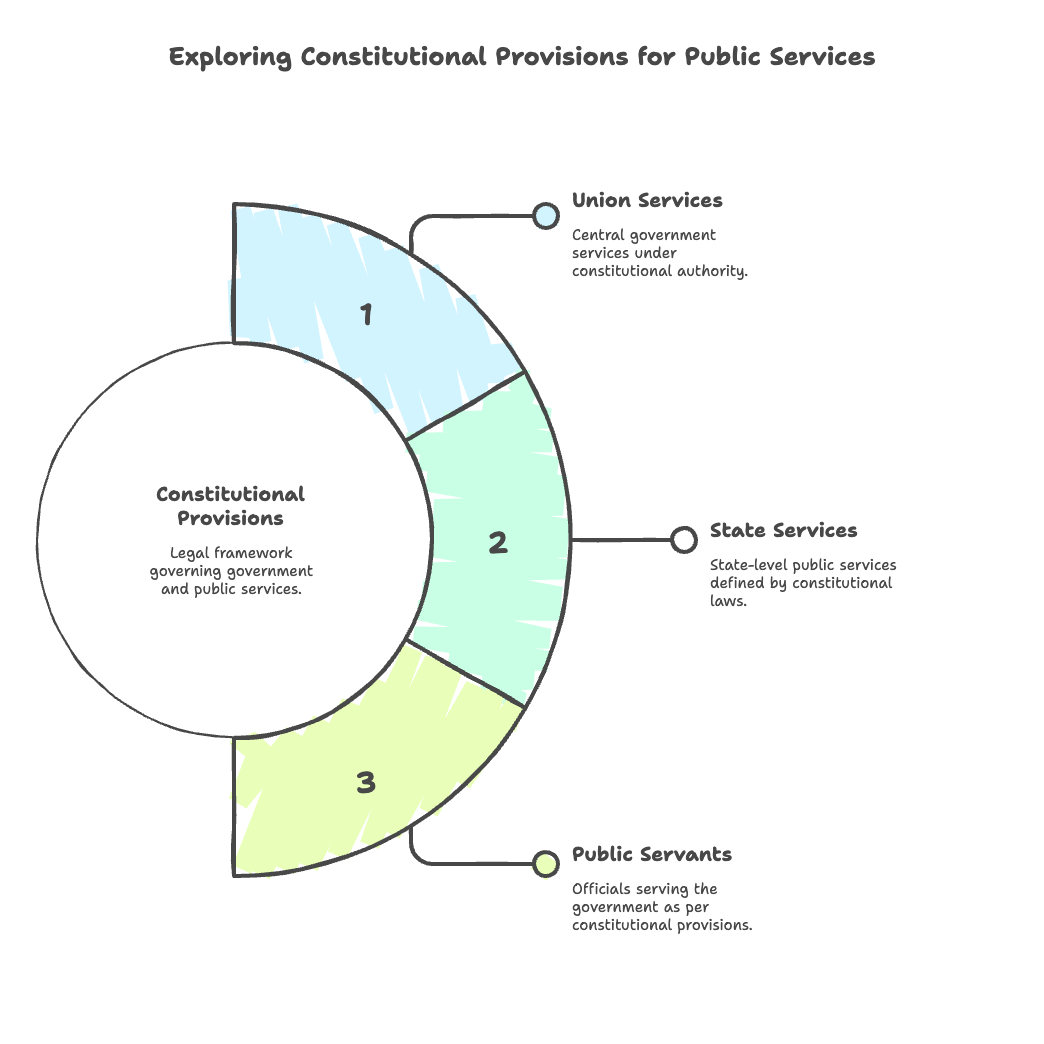Constitutional Provisions relating to Government and Public Servants – KPSC Mains Notes
The Indian Constitution envisions an efficient and impartial civil service system to ensure continuity in administration irrespective of political changes. These services are responsible for policy implementation, maintaining law and order, and delivering public services. The Constitution under Part XIV (Articles 308 to 323) lays down the structure, governance, recruitment, tenure, and conditions of service of public servants under both the Union and the States.
🏛️ Key Concepts & Features
1. Constitutional Classification of Services
Under Article 309, the services are classified into:
- All India Services (AIS) – Common to both Union and States.
- Central Services – Under exclusive jurisdiction of the Union.
- State Services – Under the jurisdiction of respective States.
- Local Services – Under municipal bodies, panchayats etc.
2. All India Services (Article 312)
- Created by Parliament on recommendation of the Rajya Sabha (2/3rd majority).
- Current AIS:
- Indian Administrative Service (IAS)
- Indian Police Service (IPS)
- Indian Forest Service (IFS)
- Officers are recruited by UPSC and allocated to State cadres.
- Serve both Union and State governments in various capacities.
📌 Karnataka Cadre Example:
- Officers posted as Deputy Commissioners, SPs, Zilla Panchayat CEOs in districts like Shivamogga, Belagavi, etc.
3. Recruitment and Conditions of Service (Article 309)
- Parliament or State Legislature can regulate recruitment and service conditions through law.
- In absence of legislation, President/Governor may make rules via executive orders.
- Basis for Central Civil Services Rules, Karnataka Civil Services Rules, etc.
4. Doctrine of Pleasure (Article 310)
- Civil servants hold office “during the pleasure” of the President or Governor.
- However, Article 311 provides safeguards (see below).
🛡️ Article 311 – Protections to Civil Servants
Provides two key protections:
- No dismissal/removal/reduction in rank without an enquiry and opportunity to be heard.
- Exceptions: If the officer is:
- Convicted of a criminal offence,
- Involved in activities that endanger national security,
- Impractical to hold enquiry (e.g., absconding).
Example:
- Dismissal of government employees in J&K for anti-national activities under Article 311(2)(c).
5. Public Service Commissions (Articles 315–323)
| Commission | Functions | Constitutional Status |
|---|---|---|
| UPSC | Recruitment, promotion, transfers, disciplinary matters for Union services | Art. 315 |
| KPSC | Similar functions for State of Karnataka | Art. 315 |
- Art. 316: Appointment by President/Governor
- Art. 320: Mandatory consultation on recruitment rules, promotions, transfers, etc.
- Art. 321: Extension of functions by law
🖋️ Karnataka Specific Note:
- Karnataka Public Service Commission (KPSC) conducts KAS and other Group A & B services recruitment.
- Recent exam reforms include interview score moderation, online application, and digitization of OMR valuation.
⚖️ Challenges & Issues
1. Lack of Fixed Tenure
- Officers transferred frequently (e.g., DCs and SPs in Karnataka get 6–8 months average tenure).
- Violates norms of administrative continuity.
- Supreme Court in T.S.R. Subramanian Case (2013): Advocated fixed minimum tenure.
2. Political Interference
- Transfers and promotions often influenced by political motives.
- Punchhi Commission criticized erosion of service independence.
3. Corruption & Integrity Crisis
- Central Vigilance Commission and Karnataka Lokayukta report rising cases of misuse of office.
- Example: BBMP tender scam, involving multiple officials.
4. Performance Appraisal
- Annual Confidential Reports (ACRs) suffer from subjectivity.
- NITI Aayog suggested outcome-based appraisal.
5. Recruitment Delays & Vacancies
- UPSC & KPSC delay cycles due to legal challenges, paper leaks.
- Karnataka Police and Education departments have over 30% vacancy rate (2023 data).
🏢 Government Schemes & Interventions
| Scheme/Initiative | Objective |
|---|---|
| Mission Karmayogi | National Programme for Civil Services Capacity Building |
| Lateral Entry in GoI | Bringing domain experts into Joint Secretary level posts |
| Digital India e-HRMS | Digitization of service records |
| Karnataka Mobile Governance (m-Gov) | Efficient grievance redress & service tracking |
| Yuva Nidhi Karnataka (2024) | Implemented through fast-track administrative officers for unemployed graduates |
📑 Important Committees & Reports
| Committee | Key Recommendations |
|---|---|
| 2nd Administrative Reforms Commission (ARC) | Ethics in Governance, Civil Services Reform, Citizen-centric admin |
| Punchhi Commission on Centre-State Relations | Fixed tenure, All-India Judicial Service, Transparent appointments |
| Sarkaria Commission | PSC independence, AIS neutrality, consultative mechanisms |
| Hota Committee | Promotion of merit and performance-linked incentives |
| NITI Aayog Strategy for New India @75 | Lateral recruitment, training reforms, service motivation |
📰 Current Affairs & Relevance (Karnataka Focus)
🔹 KPSC Reform 2023
- Shift to online-only applications and faster result processing.
🔹 Karnataka Transfers Act (2023)
- Legislated to limit political transfers.
- Officers can’t be transferred before 2 years unless in public interest.
🔹 Civil Service Training Modernization
- Administrative Training Institute (ATI) Mysuru now includes AI, Data Governance, Disaster Management modules.
🔹 Ethics Crisis in Services
- Karnataka Lokayukta arrested several officials in illegal sand mining and PWD corruption (2022–23).
🎓 Examples & Case Studies
✅ Positive: e-Governance in Mandya
- KAS officer-led digitization of birth-death certificates in local bodies.
- Reduced waiting time from 5 days to 24 hours.
⚠️ Negative: Transfer Racket in Karnataka Education Department
- Alleged monetary exchanges for postings, undermining Art. 309 principles.
🔍 SC Judgments Relevant to Services
- T.S.R. Subramanian v. Union of India (2013): Fixed tenure, record oral instructions.
- Union of India v. Tulsiram Patel (1985): Exceptions to Art. 311 explained.
🧩 Conclusion & Way Forward
India’s constitutional provisions ensure that civil services function as efficient, impartial, and accountable institutions. However, there is an urgent need to address persistent challenges like political interference, corruption, and lack of performance metrics.
🔑 Way Forward
- Implement Punchhi Commission and 2nd ARC recommendations.
- Ensure minimum 2-year fixed tenure for officers.
- Strengthen institutional autonomy of KPSC.
- Introduce ethics training, digital transparency, and lateral hiring in niche areas.
- Foster a citizen-first service mindset in public servants.

